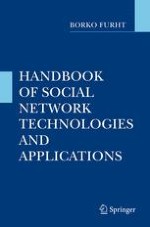2010 | OriginalPaper | Buchkapitel
22. Managing Trust in Online Social Networks
verfasst von : Touhid Bhuiyan, Audun Josang, Yue Xu
Erschienen in: Handbook of Social Network Technologies and Applications
Verlag: Springer US
Aktivieren Sie unsere intelligente Suche, um passende Fachinhalte oder Patente zu finden.
Wählen Sie Textabschnitte aus um mit Künstlicher Intelligenz passenden Patente zu finden. powered by
Markieren Sie Textabschnitte, um KI-gestützt weitere passende Inhalte zu finden. powered by
